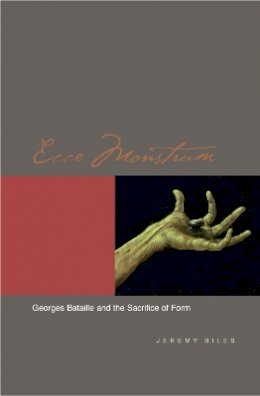
Stock image for illustration purposes only - book cover, edition or condition may vary.
Ecce Monstrum: Georges Bataille and the Sacrifice of Form
Jeremy Biles
FREE Delivery in Ireland
Description for Ecce Monstrum: Georges Bataille and the Sacrifice of Form
Hardback. In the 1930s, Georges Bataille proclaimed a ferociously religious sensibility characterized by simultaneous ecstasy and horror. This book investigates the content and implications of this religious sensibility by examining Bataille's insistent linking of monstrosity and the sacred. Num Pages: 372 pages, 5 b&w illus. BIC Classification: HP; HR. Category: (UP) Postgraduate, Research & Scholarly; (UU) Undergraduate. Dimension: 164 x 270 x 23. Weight in Grams: 564.
In the 1930s, Georges Bataille proclaimed a "ferociously religious" sensibility characterized by simultaneous ecstasy and horror. Ecce Monstrum investigates the content and implications of this religious sensibility by examining Bataille's insistent linking of monstrosity and the sacred.
Extending and sometimes challenging major interpretations of Bataille by thinkers like Denis Hollier and Rosalind Krauss the book reveals how his writings betray the monstrous marks of the affective and intellectual contradictions he seeks to produce in his readers. Charting a new approach to recent debates concerning Bataille's formulation of the informe ("formless"), the author demonstrates that the motif of monstrosity ... Read moreis keyed to Bataille's notion of sacrifice--an operation that ruptures the integrality of the individual form.
Bataille enacts a "monstrous" mode of reading and writing in his approaches to other thinkers and artists--a mode that is at once agonistic and intimate. Ecce Monstrum examines this monstrous mode of reading and writing through investigations of Bataille's "sacrificial" interpretations of Kojève's Hegel and Friedrich Nietzsche; his contentious relationship with Simone Weil and its implications for his mystical and writing practices; his fraught affiliation with surrealist André Breton and his attempt to displace surrealism with "hyperchristianity"; and his peculiar relations to artist Hans Bellmer, whose work evokes Bataille's "religious sensibility."
With its wide-ranging analyses, this book offers insights of interest to scholars of religion, philosophers, art historians, and students of French intellectual history and early modernism.
Show Less
Product Details
Publisher
Fordham University Press United States
Place of Publication
New York, United States
Shipping Time
Usually ships in 7 to 11 working days
About Jeremy Biles
Jeremy Biles is the author of Ecce Monstrum: Georges Bataille and the Sacrifice of Form (Fordham, 2007). He teaches courses on religion, philosophy, and art at the School of the Art Institute of Chicago. His writings have appeared in such places as the Journal of Religion; Culture, Theory, and Critique; and Performance Research. A selection of his drawings, some inspired ... Read moreby Andre Masson’s Acephale, appeared in the 2014 group show “Baudy” at the Adds Donna Gallery in Chicago. Show Less
Reviews for Ecce Monstrum: Georges Bataille and the Sacrifice of Form
"In this superb study of Bataille, Jeremy Biles navigates between Bataille's fascination with the horrible and the monstrous on the one hand, and his insistence on the possibility of the sacred in the modern world on the other. With erudition and level-headed admiration, Biles shows how Bataille's work is a meditation, willfully combining horror and ecstasy, joy in the face ... Read moreof death, and sacrifice as a necessary antidote to form. Biles reads Bataille on four principle thinkers: Hegel, Nietzsche, Simone Weil, and Andre Breton.The reader emerges from this study understanding, not only the importance to modernity of Bataille himself, but also the extent to which Bataille's project provides a certain modernist trajectory the ramifications of which are increasingly clear today."
-Francoise Meltzer University of Chicago "All in all, among recent studies on Bataille, Biles's book is the one that perhaps approaches best Bataille's thought while proposing new interpretations of his work." -H-Net Reviews "Biles demonstrates an excellent grasp of the critical commentary on, and the cultural context of Georges Bataille. The stakes of Bataille's work in the areas of intellectual history, literary history, and modern, and postmodern, art are clearly explored. Wonderfully informative and stimulating."
-Allan Stoekl Pennsylvania State University "One is struck by Biles's erudition: not only has he read, with patience and great sensitivity, the entirety of Bataille's writings along with his principal commentators, but he writes insightfully also about the works of the many figures (Hegel, Nietzsche, Simone Weil, Andre Breton) in relation to whom he situates Bataille."
-Peter Tracey Connor Barnard College Show Less

